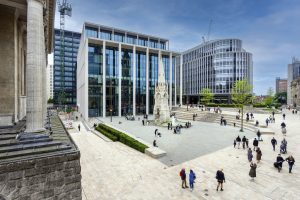Region’s industrial property bounces back as investors eye warehouses

Office and retail property in the West Midlands continue to struggle with further drops in demand but industrial property is already showing solid signs of recovery, new figures show.
According to the Q3 2020 RICS UK Commercial Property Survey, the decline in occupier demand continued in Q3, as a net balance of -35% of respondents reported a fall in tenant demand at the all sector level over the quarter for the region. However, although this figure is firmly negative, the latest reading is less downbeat than Q2.
Taking each sector individually, occupier demand for the West Midlands’ retail space dropped further with a net balance of -78% of contributors seeing a fall, as did the demand from occupiers for office space (with a net balance of -57%).
By way of contrast, occupier demand increased across the region’s industrial sector, with a net balance of +31% of respondents noting a pick-up (improving from +4% in Q2).
As a result of the drop in demand, it is unsurprising that retail vacancies are rising sharply, with available space in standard shops, shopping centres and department stores all seeing a significant increase since the onset of the pandemic. Likewise, across the region’s office sector, availability is increasing at the strongest pace (in net balance terms) since 2012.
The West Midlands’ rental growth projections also remain in negative territory for office and retail. Over the next 12 months, prime office rents are expected to fall by -3.5%, and -6.8% for secondary. On the same basis, prime retail rents are envisaged falling by -11.2%, with rental expectations across secondary retail locations falling by -14.4%. In contrast, survey participants now anticipate prime industrial rents to rise by 2.4% over the year to come. The outlook is mildly positive, for secondary industrial rents.
Aside from the traditional segments, rental expectations are highly varied across alternative commercial property classes. Hotels in the West Midlands display amongst the weakest 12-month projections for rents with -78% of contributors expecting a fall. Student housing is also expected to see a fall, but +35% of contributors expected rents for data centres to post solid growth over the year ahead.
This sees respondents anticipating capital values rising for data centres (net balance +44%) and aged care facilities (net balance +31%) over the year to come, but with relatively steep declines during the next 12 months across all remaining categories covered, with net balance readings standing at -50% for offices, -83% for retail, and -77% for hotels. Twelve-month capital value expectations are now comfortably positive for both prime and secondary industrial assets, returning net balances of +51% and +31% respectively.
Tarrant Parsons, RICS economist, said: “Sentiment across the commercial property market continues to be weighed down by the challenging economic backdrop. In particular, the physical retail sector, which was already struggling prior to the latest crisis, is being hit hard by the accelerated switch into online shopping and a drop in footfall associated with social distancing. Likewise, occupier demand across the office sector remains in decline and may continue to come under pressure going forward as businesses reassess their office space requirements following the increased prevalence of remote working.
“That said, some portions of the market appear to be well placed to expand in the face of these structural changes sweeping the economy. Indeed, the latest results point to a solid rebound within the industrial sector, with increased capacity in this segment needed to meet the sharp rise in online spending. As such, the 12-month outlook for prime industrial rents and capital values has already returned to positive territory according to the Q3 survey feedback.”









